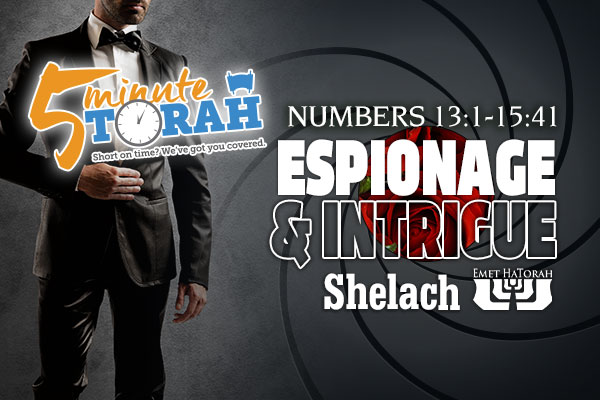Parashat Shelach - Numbers 13:1-15:41
Series:

As most people know, James Bond—agent 007—is the flamboyant hero created by Ian Fleming in the 1950’s. This parashah is not about him, but one might think so, given the introductory subject of this week’s Torah portion. This week’s reading begins with the story of the twelve spies who are sent into the land of Canaan ahead of the Children of Israel. When many people think of spies and espionage, they imagine someone in the likes of Fleming’s popular fictional character. But the leaders of the tribes of Israel sent out to Canaan were not spies in the same sense as this British secret agent. Were they really “spies” in the traditional sense of the word? As we will soon see, these men had another purpose for being sent out altogether.
As we know, spies are sent out by a top security administration in their government. Their mission is top secret and only a handful of people know what they are doing and why. Upon completion of their mission they report back directly to their superiors and not to the general public. These twelve spies, however, do not fit this mold. Not only were they commissioned by the entire nation, but they reported back to the general public as well. What’s going on here?
We can find the answer to our question by examining the commissioning of these twelve men and discerning their intended mission. First, let’s take a look at our current portion:
The LORD spoke to Moses, saying, “Send men to spy out the land of Canaan, which I am giving to the people of Israel. From each tribe of their fathers you shall send a man, every one a chief among them.” (Numbers 13:1–2)
The first question we need to ask is who commissioned this team of elite men from each of the tribes? According to this passage, it appears that Hashem initiated this reconnaissance mission. He clearly tells Moses, “Send men to spy out the land of Canaan.” It seems like an open and closed case. However, once we begin the book of Deuteronomy, we find that our conclusion may not be as simple as we think. In the very first chapter, Moses recounts the last forty years of leading the Children of Israel. When he begins to describe the incident with the spies, he begins a little differently than we read in this week’s portion:
Then all of you came near me and said, “Let us send men before us, that they may explore the land for us and bring us word again of the way by which we must go up and the cities into which we shall come.” The thing seemed good to me, and I took twelve men from you, one man from each tribe. (Deuteronomy 1:22–23)
From this secondary account of the same event, we see that the commissioning wasn’t initiated by the LORD. If we put the accounts together we can see that it went something like this. The Children of Israel petitioned Moses to allow them to send a group of men into the land to explore the land and determine the route they would take when leading the people through. They also wanted to learn more about the existing cities in the region and the military strength of the Canaanite nations. Moses placed this request before the LORD, and it was approved, but with reservation. He had already told them about the land and that He would fight their battles for them. So, when Hashem gave the directive to “spy out the land,” He did so as a father who gives in to his children who are begging to do something when he has already told them no.
This can be seen in the instruction He gave them. He told them, shelach lecha, which is commonly rendered as “send forth.” However, it literally means “send for yourself.” We can see from this that Hashem is telling them, “If you can’t trust me, feel free to go do it your own way. Send out men to see with their physical eyes. They won’t see what I see and the results will not be the same.” Sometimes we think we know better than those who are wiser than us. Like a child, we kick and scream until we wear down our parent to get what we ask for. And in the end we suffer from the results.
No, the twelve were not spies in the traditional sense. They were merely representatives of a nation who could not trust the wisdom of their Heavenly Father. May we learn from their lesson and work to bring tikkun (reparation) to the damage caused by the spies through trusting and obeying our Heavenly Father. May we be like Joshua and Caleb, and always know that if Hashem has said it, we can trust it.








